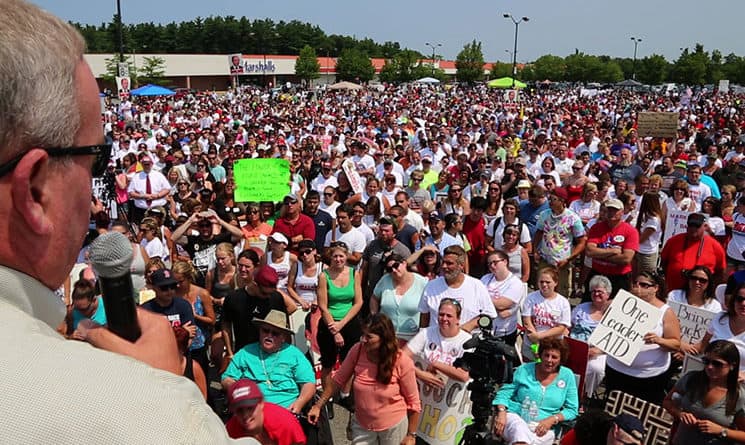When Market Basket’s board of directors fired Arthur T. Demoulas last summer, employees and customers of the New England grocery chain rallied behind the deposed CEO. After a summer of boycotts, rallies, and board meetings, Demoulas purchased the company from his cousin, Arthur S. Demoulas, and was reinstated as CEO. And filmmaker Jay Childs was there to capture it all on film.
Childs, who owns JBC Communications in Portsmouth, is the director of “Food Fight: Inside the Battle for Market Basket.” And, in the same way that Market Basket fans rallied for Artie T. in 2014, Childs is hoping potential audiences will rally behind his new film, currently in production.
Childs and producer Melissa Paly have mounted a Kickstarter campaign to raise $50,000 to finish shooting the film and begin editing it. The fundraising deadline is Sunday, Jan. 11, and the project still needs to raise approximately $16,000 as of press time.
Childs began following the story in 2013. He was looking for a new subject for a documentary, and a friend suggested he look at Market Basket and the Demoulas family.
“I had grown up (around) Market Basket,” Childs said. “My parents shopped there, I had friends who worked there, and I knew about this dichotomy between this friendly, low-priced, streamlined business … and this feuding family. But nobody had really done it on film.”
Childs started filming in October 2013 at a rally in Waltham, Mass. Construction on a new Market Basket there had been delayed, and CEO Arthur T. Demoulas, who’d recently lost control of the company’s board of directors, was there to speak. For Childs, that was the moment the story clicked.
Arthur T. Demoulas speaks at a rally
“It was as if it was a papal arrival. It was something I’d never experienced,” he said. “I knew there was absolutely something here I could follow.”
For the next few months, Childs stuck with the story, doing interviews and conducting background research, thinking that the focus would be on the famously fractured Demoulas family. When the board of directors fired Demoulas in June 2014, Childs found himself at the center of a story that captivated New England — and the rest of the country — for much of the summer.
“It was me and somebody from WBZ Radio covering” the meeting where Demoulas was fired, Childs said. “Then, the day after, when (employees) had their first rally … it went from nobody (covering it) to … this huge boom overnight.”
Childs kept filming throughout the summer as workers rallied in support of Demoulas and customers boycotted their local Market Baskets. He covered “about 38 of the 49 days” of the protest. He was there early in the morning and late at night, capturing on camera employees and customers. He even interviewed the food truck operator who came by every day to sell breakfast and lunch to the protestors, and was at the company’s headquarters in Tewksbury at 2 a.m. one August morning when the Market Basket board accepted Demoulas’ offer to buy the company.
“It was as if it was a papal arrival. It was something I’d never experienced. I knew there was absolutely something here I could follow.”
— filmmaker Jay Childs
It was difficult to gain the trust of protest leaders, he said.
“Over time, they begrudgingly accepted the fact I was the guy who kept showing up and who was interested in the story,” he said. “I had to convince them I wasn’t Michael Moore, that I just wanted an honest accounting.”
The Market Basket saga is captivating for a number of reasons, according to Childs. It’s unheard of for employees to go to bat for a CEO, for one thing. “The brand of ‘CEO’ has been damaged in many circles,” he said. “But the (Market Basket) warehouse was the first place to shut down, and you had warehouse workers who probably didn’t make a whole lot of money willing to walk off their jobs for their CEO.”
Workers rally for Artie T.
He also got to know the employees and customers at Market Baskets throughout the region. He met one store manager who runs a store in a low-income neighborhood. Though most deliveries had stopped, Childs said the manager kept items he knew his customers relied on in stock. “He found a way to encourage people not to shop there, while at the same time being duty-bound to serve the customers they had,” he said.
Though the drama is over, Childs said the ramifications of the battle for Market Basket will be felt for many years. As part of the film, he’s interviewed academics, journalists, and others who closely followed the story. Other companies, he said, are looking for ways to replicate the company’s success.
“You can treat workers well, pay and compensate them well … provide low prices and good service, and still be highly profitable,” he said.
If the project doesn’t meet its funding goal, Childs said he and Paly will “pause and catch our breath.” But he’s optimistic. He’s heard that some Market Basket stores are holding raffles and raising contributions for the film. “People just want to see the story,” he said.
All images from Jay Childs’ Food Fight.

